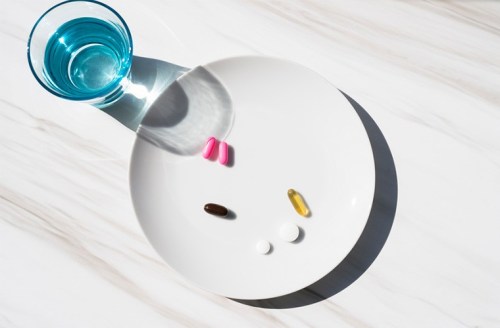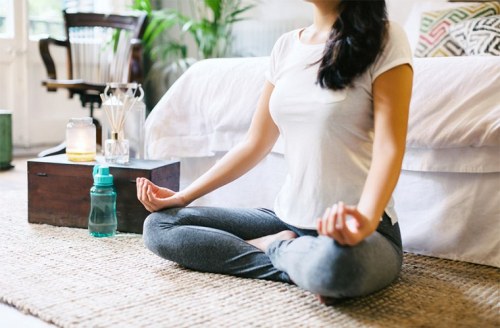I got myself off antidepressants the natural way—and I’m never looking back
Discontinuing use of antidepressants is a complex process. But a healthy lifestyle, some vitamin supplements, and a good MD, can really help you wean off them.

It was a few months ago when I was taking my antidepressant—just as I did every night for the past five years—and realized I didn’t really want to be on it anymore.
The shrink who’d prescribed it to me had never said I’d need to take it forever (though no one had said I wouldn’t). But that night, surveying my new thinking about all of this in the moment I swallowed it down, I wondered: had it become a habit, or even a crutch in my life, rather than a necessity for a serious depression? (Answer: In my case, probably.) So how would I safely get off it?
This is my brain on drugs
I think I should say that while some people might need a mood-regulator or a SSRI (selective serotonin reuptake inhibitor) for super-solid chemical reasons, I think I needed an antidepressant for environmental ones. One reason? My situation has become entirely different than it was when I was first prescribed Lexapro, a common SSRI variant. And it’s made a big difference. Boxes have been checked, and I’m essentially where I want to be—I have a great job, a great boyfriend, great friends. My mood matches my pretty decent reality. And my reality, even when sucky things happen now, doesn’t totally steamroll my mood (or total sense of self).
I was curious: could my pretty healthy exercise and eating habits (along with my sporadic attempts at meditation) provide enough mood-boosting wind in my sails?
That’s not to say I’m not still depressed, of course. High-functioning depression is a very real thing, after all. I just feel like I’m in a better place, and more capable of not having to rely on pills to be truly happy. And more importantly, I wanted to test if this was true.
Intellectually, I’d gotten some confidence for going off the Lexapro from things I was learning on the wellness beat at work. My theory: I probably produce a really steady stream of happiness-boosting endorphins, since I’d become an avid attendee of HIIT workouts, and I also avoid enough inflammatory foods to naturally level me out—so why not reduce the number of chemicals I’m ingesting?
And after learning more about the connection between the gut and depression, I was curious as to whether my pretty healthy exercise and eating habits (along with my sporadic attempts at meditation) could provide enough mood-boosting wind in my sails.
So I set out to stop using the medication that had leveled me out for years—which honestly felt like going into battle without any armor.

The problem with discontinuing antidepressants
But you can’t just stop taking the pills. I’ve had occasions in which I had missed a couple of doses, and felt significant changes in my brain chemistry (some Googling produced the term “brain zaps,” which quite accurately described the weird and uncomfortable sensation you can feel after skipped doses).
So I had no illusions that the process of getting off antidepressants is complex, and not something that should be done without a doctor’s supervision. I went to see Meredith Bergman, M.D., a holistic psychiatrist, to see what I should do.
Dr. Bergman is really approachable and communicative for a shrink; not at all like the MD who gave me Lexapro, four minutes of his time, and a good-luck pat on the back. But she didn’t sugar coat this info: “Drug companies do not conduct research into how to taper off these medications, leading some physicians unprepared and without specific protocols for doing so,” she told me in her cozy New York City office. “This can lead to patients being maintained on drugs indefinitely, as there are only a few vague guidelines about when or how to attempt a taper—especially in complicated situations when more than one medication is involved or the patient has multiple diagnoses or medical problems.”
“Drug companies do not conduct research into how to taper off [antidepressants], leading some physicians unprepared and without specific protocols for doing so.”
And discontinuing your antidepressants can lead to serious withdrawals—even in well-managed scenarios like the one I was trying to create with Dr. Bergman. She explained that getting off antidepressants is easier if you’ve been on them for less than six months—and it’s significantly harder when you’ve been on them for more than five years, which was my case. I wanted to prevent discontinuation syndrome. (I mean, who wants to replace one syndrome with another?)
“Discontinuation syndrome is the term for the withdrawal reactions (somatic and psychological) which occur from the sudden decrease in neurotransmitter (i.e., serotonin) activity when an antidepressant is stopped,” says Dr. Bergman. “It has been documented in all classes of antidepressant agents including TCAs, MAOIs, SRIs, SSRIs, and SNRIs. It doesn’t mean that you are ‘addicted’ to your medication. Symptoms can be mild or severe and disabling, and can happen immediately after missing a dose and may last for several months.” I crossed my fingers on this last point, hoping, like when a drug ad rattles off a list of horrid side-effects that occur in just a handful of people, that I’d be spared.
Of course, I was also warned about (and worried about) the risk of relapse, which again is higher the longer you’ve been on medication. I was in a vulnerable place, having just reached that five year mark, so I had to be extra careful—but I was determined that I could pull through.

My strategy for getting off antidepressants
The good news is that things like talk therapy can be really useful in providing support during this time, whether with a professional or, more affordably, with your friends and family. So can exercise, a healthy diet, meditation, yoga, proper sleep, and avoidance of alcohol or other illicit drugs, says Dr. Bergman—all totally doable (and normal) for me.
This was our plan: Continue cutting my pills into quarters and taking those until they ran out (confession: I had done that for the last month of my prescription and had zero refills left anyway). The smaller the dose you end with, the better.
“Please enjoy these healthy snacks,” I was saying to my brain, hoping it would forget that we were no longer consuming the feel-good pills.
Also: get supplements. “Usually my strategy is to prescribe one tablet of Prozac 20mg, which has a long half-life that washes out on its own,” says Dr. Bergman. “But vitamins and supplements can also be useful in reducing discontinuation symptoms.”
Dr. Bergman says these are the mental health supplements everyone should be taking. “Natural agents like GABA, rhodiola, L-theanine, melatonin, valerian root, passionflower, zinc, and evening primrose are also great,” she says.
I didn’t get all of them (perhaps wrongfully), but I stocked up on magnesium (the “feel-good mineral”), evening primrose, probiotics, and omega-3s and hoped that would be enough of a substitute for the SSRIs my brain was used to. “Please enjoy these healthy snacks,” I was saying to my brain, hoping it would forget that we were no longer consuming the feel-good pills.

My journey off of the crutches
When I ran out of my antidepressants, I felt like I was going out into the world without my metaphorical crutches. And things got messy without them.
Bergman did say mood swings and emotional sensitivity were a normal reaction for the first week to month (or longer)—so I wasn’t surprised when I found myself extra upset about a work annoyance that first day (I’m talking near-meltdown mode) or when I cried more than usual over the next couple of weeks (sometimes just from listening to a Frank Ocean song). I felt seriously emotionally fragile and could hysterically cry at the drop of a pin. I was a little worried that this wasn’t going to work.
I didn’t feel the pain of withdrawal though, which was lucky and important. So I tried powering through with extra care to get in a regular sweat sesh, and take the supplements recommended by Dr. Bergman, with the hope that it would get easier with time.
Finding the inner strength to manage my depression—especially during the lows—has proven to me that I can always find the light for myself when it seems like I’m immersed in darkness.
Over the past couple of months, I’ve noticed that the extreme emotional roller coaster has been subsiding. I have to tell myself that I’m strong enough to deal with everyday stressors and bad situations that come up, and sometimes I do doubt it and close off. I’ve discovered the power of the breath, which has come to my rescue in tough moments. And communicating my feelings with someone takes a lot off my shoulders—holding everything in would make it much harder to cope.
I still cry and feel really low at times. Depression is an illness that takes a conscious effort to live with, and getting off antidepressants definitely isn’t for everyone.
I’m lucky, I realize. Finding the inner strength to manage my depression—especially during the lows—has proven to me that I can always find the light for myself when it seems like I’m immersed in darkness.
And when I think about what I’ve been through—all on my own—it brings a smile to my face.
Sign Up for Our Daily Newsletter
Get all the latest in wellness, trends, food, fitness, beauty, and more delivered right to your inbox.
Got it, you've been added to our email list.










